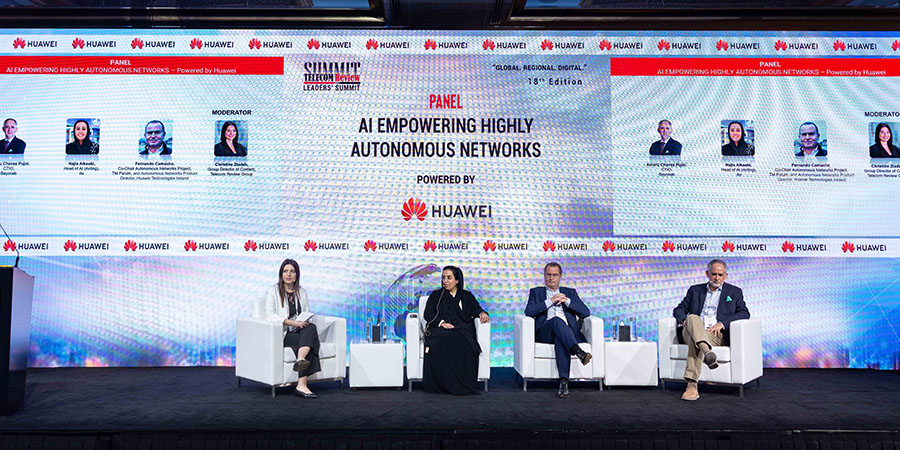The panel discussion titled ‘AI Empowering Highly Autonomous Networks’ explored the transformative role of artificial intelligence (AI) in creating more autonomous and intelligent networks.
Esteemed panelists included, Najla Alkaabi, Acting Head of AI, du; Amaru Chavez-Pujol, CTIO, Bayobab; Fernando Camacho, Co-Chair of the Autonomous Networks Project at TM Forum, and Autonomous Networks Product Director at Huawei Technologies Ireland.
The session was moderated by Christine Ziadeh, Group Director of Content, Telecom Review Group.
Recognizing the impact of AI on network operations, Alkaabi emphasized that the journey towards highly autonomous networks is a crucial part of digital transformation. She highlighted the rise of generative AI (GenAI) and advancements in large language models (LLMs) and small language models (SLMs), which have consequently given rise to rapid adoption.
She said that AI has the potential to make networks more "human," enabling intuitive interactions.
Regarding empowering the workforce through AI integration, she said her company adopted a bottom-up approach to identify gaps and build strengths, accelerating the AI competency journey within the organization.
She stressed the importance of preserving digital transformation pillars, ensuring values and missions remain intact amidst technological shifts.
Alkaabi noted that a strong focus on data governance, privacy, security, fairness, sustainability, and explainability should be prioritized to minimize customer risks. She further explained that du is currently navigating the early stages of AI-driven transformation, adding that robust governance will ensure progress in the right direction.
Meanwhile, Chavez-Pujol emphasized the need for the thoughtful implementation of AI in telecom networks, noting the importance of feeding accurate information to AI systems for optimal results.
He emphasized the importance of integrating AI applications to improve network performance, such as enabling self-healing networks, addressing issues in subsea cables, and implementing intelligent re-routing to enhance service reliability. Additionally, he highlighted the need for proactive monitoring through large network operation centers to predict potential service disruptions and to adapt offerings based on predictive models.
“We are just scratching the surface with opportunities for new service creation,” he explained.
Camacho underscored the growing complexity of networks and the need for embedded intelligence. He said that the inevitability of AI in networks and its role in achieving Level 4 autonomy, where networks make decisions assisted by human oversight, cannot be overlooked. He also highlighted the importance of leveraging telco-specific foundational models to enhance operational success.
In conclusion, the panel highlighted the immense potential of AI in driving network autonomy, improving efficiency, and creating intelligent, proactive systems. With a clear focus on governance, sustainability, and innovation, the telecom industry stands poised to harness AI's capabilities for a more connected future.
Also Read: Embracing the Foundation Model to Usher in L4 Autonomous Wireless Networks
Also Read: Networks for AI: Telecoms Networks Facing the Boom of Artificial Intelligence Uses
Also Read: 5G Standalone: New Ways to Operate and Automate Networks










